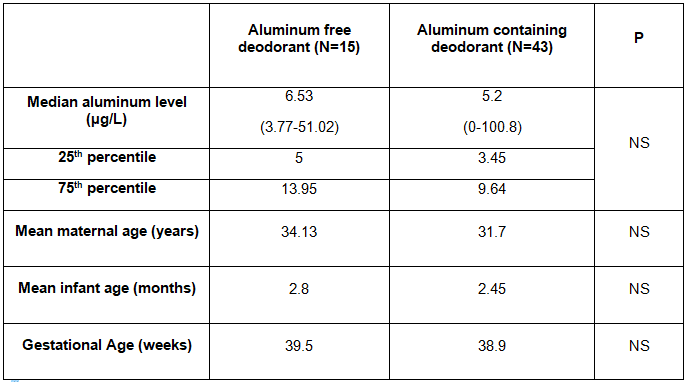
Aluminum Content in Human Milk from Mothers Who Use Deodorants – a Prospective Study
2Department of Neonatology, Dana Dwek Children's Hospital Affiliated to Sackler Faculty of Medicine, ישראל
3Clinical Pharmacology and Toxicology Unit, , Assaf Harofeh Medical Center, Affiliated to Sackler School of Medicine, ישראל
Background: Exposure to aluminum may originate from a variety of sources including deodorants. Aluminum toxicity can cause a wide range of neurological impairments. Infants are exposed to aluminum form human milk(HM) or formulas. Aluminum levels(AL) are higher in formulas then in HM, especially in preterm-and soy-formulas. Due to the potential risks to infants, it’s been recommended the use of aluminum containing deodorants(ACD) in breastfeeding mothers be decreased.
Our study aim was to determine whether the use of ACD affects AL in HM.
Methods: Prospective comparative study. Enrolling healthy mothers exclusively breastfeeding infants aged up to 4 months. Each filled a questioner containing sociodemographic data and questions regarding aluminum exposure. HM was expressed during the morning’s first breastfeed. Samples were classified according to deodorant type. AL where measured by a dedicated device using Atomic Absorption LOD 5ppb.
Results: Fifty-eight mothers enrolled, 15(26%) used aluminum free deodorant(AFD) and 43(74%) used ACD. Groups were identical in terms of previous breastfeeding and nutritional habits. Median AL was 5.6 microgram/L (0-100) (mean AL 11.38±17.4 but data wasn’t normally distributed).There was no statistically significant difference in HM aluminum content between the ACD vs. AFD groups(p=0.19). AL in HM wasn’t affected by maternal/infant age, previous breastfeeding experience, number of children, maternal nutrition and aluminum exposure.

Conclusion: We found no statistically significant difference in HM AL between ACD vs. AFD groups. Median AL were substantially lower compared to previous literature.Although our sample size is small, this preliminary data suggests that the use of ACD doesn’t increase AL in HM. Further studies needed.
Powered by Eventact EMS